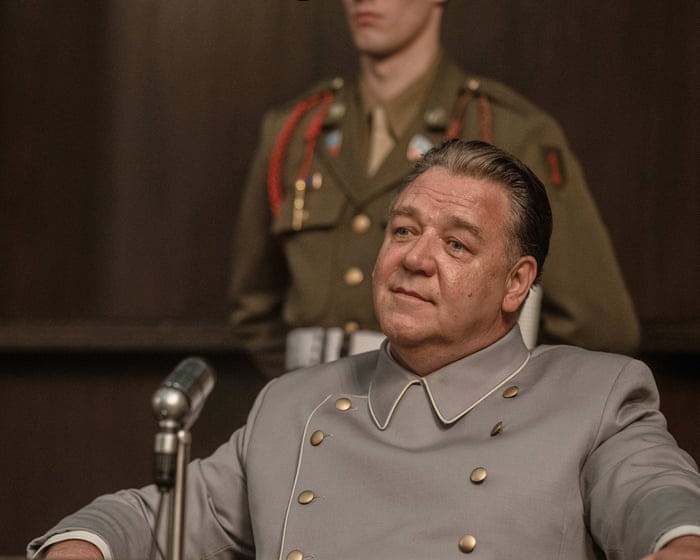During the Nuremberg trials of 1945 and 1946, Hermann Göring, Hitler’s second-in-command, was among the Nazis prosecuted. Less known is the role of American psychiatrist Douglas Kelley, who spent over 80 hours interviewing and evaluating Göring and 21 other Nazi officials before the trials. As detailed in Jack El-Hai’s 2013 book The Nazi and the Psychiatrist, Kelley was both captivated by Göring and troubled by his realization that the Nazis’ crimes were not unique to that era or group—they could occur anywhere. This insight, and the world’s apparent unwillingness to learn from it, ultimately devastated him.
Writer-director James Vanderbilt, who previously explored a professional’s obsession with truth in Zodiac, has adapted El-Hai’s book into his new film, Nuremberg. Russell Crowe portrays the charismatic Göring, Rami Malek plays Kelley, and Michael Shannon appears as Robert Jackson, the Supreme Court justice who helped organize the trials and confronted Göring in court.
The line “Hitler made us feel German again” is chillingly reminiscent of sentiments heard today. For Malek, the role allowed him to revisit ideas about evil that had lingered since playing Safin, James Bond’s killer in No Time to Die. “When I was playing a Bond villain, I told myself, ‘He’s evil,’ but then I started questioning that,” he says. His empathy made it difficult to accept pure evil, and he was struck by the banality of it all, much like Kelley. “It must have been jarring for him to realize this could happen anytime, under any regime. We see atrocities erupt suddenly, often because we choose to look away.”
Vanderbilt saw a real-life Silence of the Lambs dynamic in the story, with Kelley drawn into a seductive relationship with a psychopath. “Göring was funny, gregarious, and charming,” Vanderbilt notes. “He loved his family, which makes him even more terrifying. He wasn’t like Darth Vader; he craved power and was indifferent to others’ suffering as long as he maintained it.”
Shannon observed Crowe’s magnetic charisma on set: “Russell really embraced Göring’s charm. He made the other actors playing Nazis feel like a group, leading them in songs as they entered together.”
Crowe had been attached to the project since 2019, and Vanderbilt had worked on it for five years prior. Before filming began, Jonathan Glazer’s Oscar-winning The Zone of Interest offered a fresh take on Holocaust narratives, focusing on the mundane lives near Auschwitz without showing the horrors directly. Vanderbilt saw it during pre-production and admired its perspective. When asked if it made Nuremberg seem outdated, he responded, “I think there’s room for different approaches.”He says, “Our film is a bit more traditional. A friend of mine refers to a certain kind of movie—and ‘The Zone of Interest’ isn’t one of them—as ‘spinach movies.’ You know, the ones where you have to eat your vegetables, do your homework, take your medicine. I worked hard to ensure ‘Nuremberg’ didn’t come across that way.”
However, Shannon believes audiences should still watch ‘Nuremberg.’ He states, “It ought to be mandatory viewing. Everyone should see the film and reflect on what happened because it’s highly relevant to current events. But it’s also a piece of entertainment, which is odd for such a serious topic. It’s a movie in the grand, old-fashioned sense.”
He also praises ‘The Zone of Interest,’ saying, “It places the audience in a position where they have to imagine what isn’t shown. That’s when you truly engage them.” In contrast, while Glazer’s film shows very little, ‘Nuremberg’ takes the opposite approach by including a five-minute clip from the documentary footage of concentration camps that was shown during the trials.
Filming the courtroom scene where this footage is played made Shannon uneasy. “While I was being filmed watching it, I was very uncomfortable with the idea of ‘acting.’ I didn’t want the camera on me; it felt somewhat profane. Yet, I understand why it’s in the film. You’ll notice I introduce the footage, and then they don’t cut back to me, which probably reflects how uncomfortable I was. They might have thought, ‘Let’s not cut back to Shannon; he looks off.'”
When I shared this with Vanderbilt, he laughed and denied it, saying, “Michael was brilliant. And we’re not always supposed to be comfortable in our work, right? I asked the cast not to watch the camp footage beforehand so their reactions would be fresh. We used a real projector and had 300 extras in the courtroom. I told everyone it would be a tough day but important for the story. We observed a moment of silence, then played the film. I don’t mean to say no acting was needed, but you’re seeing genuine emotions on their faces.”
The filmmaker seems less inclined to explore what it means to release ‘Nuremberg’ in a world where fascist ideas are becoming more mainstream and sanitized, and where one of the world’s wealthiest and most powerful men can publicly make what looks like a fascist salute and still be highly rewarded.
Much of the dialogue in ‘Nuremberg’ echoes our times, such as when Göring admiringly says of Hitler that he “made us feel German again.” Vanderbilt denies any intentional parallel to a recent U.S. political slogan, noting, “I wrote that line in 2016.””Sure,” he points out. While that may be true, he still decided to keep it in the script even after the Maga movement had become widespread and gained many followers. “I get why people want to connect it to today, and I’m not saying they shouldn’t. I’m not being evasive. I just believe that all meaningful drama reflects our current reality.”
It’s understandable that Vanderbilt wouldn’t want to discourage Trump supporters from watching his film. Malek, however, is more direct. “The line ‘Hitler made us feel German again’ is chilling in its simplicity,” he says. “And it strongly echoes a phrase we hear today that ends with the same word.” He deliberately avoids repeating the Maga slogan he’s referring to, adding, “But I think anyone reading your newspaper will know exactly what I mean.”
Shannon takes it a step further. When asked if giving so much screen time to Göring is risky, he responds seriously, “The danger isn’t just in this movie—it’s everywhere around us. We’re drawn to that kind of charisma, and it might be our undoing. We prefer entertainment over being well-governed. It’s truly tragic.”
He describes life in the U.S. today as “a nightmare. America is a nightmare right now. The country is mentally ill and needs help. There’s an equal mix of grandiosity and self-hatred, and it gets worse every day. I’ve never seen such dysfunction in my life. It’s really embarrassing.”
At the end of the film, Kelley is criticized for criticizing the U.S. while promoting his book about the Nazis. The promoters of Nuremberg might be distressed by Shannon’s comments. “I’m sure everyone involved in marketing this film will be horrified by what I’ve said in this interview,” he acknowledges. “But I don’t really care.”
Nuremberg will be in UK cinemas starting November 14 and in Australian cinemas from December 4.
Frequently Asked Questions
Of course Here is a list of FAQs about the topic Hermann Gring loved his children Thats whats terrifying based on the discussion with James Vanderbilt Rami Malek and Michael Shannon
General Beginner Questions
Q What is this quote Hermann Gring loved his children Thats whats terrifying from
A Its a line from the 2024 film Nuremberg spoken by Rami Maleks character It highlights the chilling paradox of a war criminal also being a loving family man
Q Who are the people discussing this
A The discussion involves the films writerdirector James Vanderbilt and its stars Rami Malek and Michael Shannon who play key figures in the Nuremberg Trials
Q What is the main point of this quote
A The point is to show that evil is not always a cartoonish monster The most terrifying evil can exist in people who also have human relatable qualities like love for their family making them more complex and disturbing
Q What movie or project is this about
A This is about the movie Nuremberg which dramatizes the postWWII trials of Nazi war criminals
Advanced Thematic Questions
Q Why did James Vanderbilt choose to include this specific idea in the film
A To move beyond onedimensional portrayals of Nazis and explore the psychological complexity and banality of evil It forces the audience to confront the uncomfortable truth that perpetrators of atrocities were also human beings
Q How do Rami Malek and Michael Shannons characters relate to this theme
A Malek plays a psychologist Douglas Kelley who is tasked with understanding the defendants minds Shannon plays Frank B Wallis a member of the American legal team Their roles involve piercing through the defendants facades to uncover the ordinary humanity that coexisted with their horrific actions
Q What is the historical context for this discussion
A The Nuremberg Trials were the first of their kind establishing crimes against humanity Understanding the defendants as complex individuals rather than pure monsters was a crucial and unsettling part of the legal and psychological process



